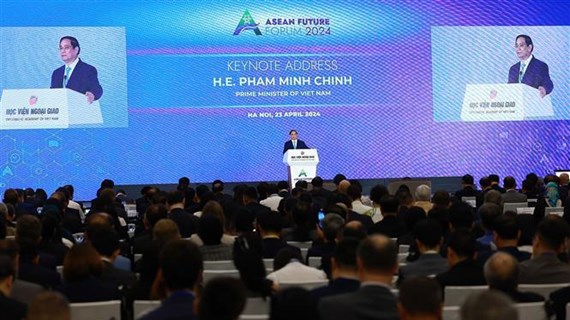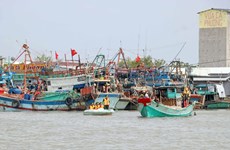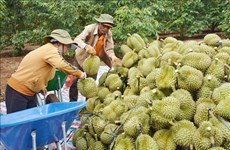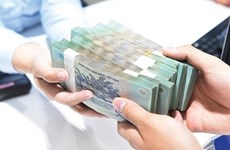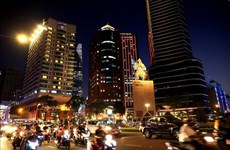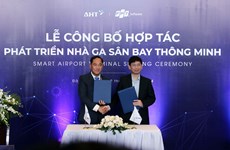Japanese capital moves towards trade sector
Japanese investors in Vietnam are likely to shift their capital to
the trade and service sectors given the advantages of the ASEAN-Japan
Comprehensive Economic Partnership Agreement (AJCEP) in 2015-2019 and
the ASEAN Trade in Goods Agreement (ATIGA) in 2015-2018.
Japanese investors in Vietnam are likely to shift their capital to
the trade and service sectors given the advantages of the ASEAN-Japan
Comprehensive Economic Partnership Agreement (AJCEP) in 2015-2019 and
the ASEAN Trade in Goods Agreement (ATIGA) in 2015-2018.
According to the Ministry of Finance, more than 3,200 tax categories on materials, machines and equipment, electronics and spare parts from Japan have enjoyed a zero-percent tax rate from April 2015 as a result of the Vietnamese preferential tariff within the AJCEP framework.
Furthermore, many goods imported from regional countries are expected to be cheaper than domestically made products under the ATIGA, the ministry said.
With these agreements, the Japanese have more reasons to focus on trade and service development projects in Vietnam , it added.
General Director of Aeon Vietnam Yasuo Nishitohge told the Dau Tu (Investment) newspaper that the new tariff policy has had a positive impact on retail groups like Aeon, adding that the import tax reduction has enabled the company to diversity its products and sell goods at reasonable prices and with high quality for Vietnamese customers.
Another retail giant from Japan, Family Mart, affirmed that it will not withdraw from the Vietnamese market. A representative from the company said it plans to have 100 stores in Vietnam by 2015 and increase the number to 800 in the next five years to make up around 30 percent of the Vietnamese market share.
According to a survey conducted by the Japan External Trade Organisation (JETRO), Vietnam granted investment licences to 517 Japanese investment projects last year, including 342 new ones and 175 for business expansion.
The organisation revealed that the total investment capital of Japanese firms in Vietnam in 2014 was as much as 60.9 percent of that from the previous year; however, investment projects in the fields of trade and services increased in volume, including 85 percent of under-five-million-USD projects.
The trade activities of Japanese firms in the fields are expected to be more bustling in the coming time due to their competitively high quality products, according to the consulting services corporation RECOF.
Many Japanese enterprises aim to expand their operations in Vietnam, especially in non-banking financial services, transport, technology, hotels, marketing and retail, it said.
For example, the Japan Logistic Systems Group is pouring investment to build store houses in Hanoi, Da Nang and Ho Chi Minh City; while the Nissin Group is partnering with Vietnam Railways to operate a cargo transporter specially designed for Japanese firms.-VNA
According to the Ministry of Finance, more than 3,200 tax categories on materials, machines and equipment, electronics and spare parts from Japan have enjoyed a zero-percent tax rate from April 2015 as a result of the Vietnamese preferential tariff within the AJCEP framework.
Furthermore, many goods imported from regional countries are expected to be cheaper than domestically made products under the ATIGA, the ministry said.
With these agreements, the Japanese have more reasons to focus on trade and service development projects in Vietnam , it added.
General Director of Aeon Vietnam Yasuo Nishitohge told the Dau Tu (Investment) newspaper that the new tariff policy has had a positive impact on retail groups like Aeon, adding that the import tax reduction has enabled the company to diversity its products and sell goods at reasonable prices and with high quality for Vietnamese customers.
Another retail giant from Japan, Family Mart, affirmed that it will not withdraw from the Vietnamese market. A representative from the company said it plans to have 100 stores in Vietnam by 2015 and increase the number to 800 in the next five years to make up around 30 percent of the Vietnamese market share.
According to a survey conducted by the Japan External Trade Organisation (JETRO), Vietnam granted investment licences to 517 Japanese investment projects last year, including 342 new ones and 175 for business expansion.
The organisation revealed that the total investment capital of Japanese firms in Vietnam in 2014 was as much as 60.9 percent of that from the previous year; however, investment projects in the fields of trade and services increased in volume, including 85 percent of under-five-million-USD projects.
The trade activities of Japanese firms in the fields are expected to be more bustling in the coming time due to their competitively high quality products, according to the consulting services corporation RECOF.
Many Japanese enterprises aim to expand their operations in Vietnam, especially in non-banking financial services, transport, technology, hotels, marketing and retail, it said.
For example, the Japan Logistic Systems Group is pouring investment to build store houses in Hanoi, Da Nang and Ho Chi Minh City; while the Nissin Group is partnering with Vietnam Railways to operate a cargo transporter specially designed for Japanese firms.-VNA





